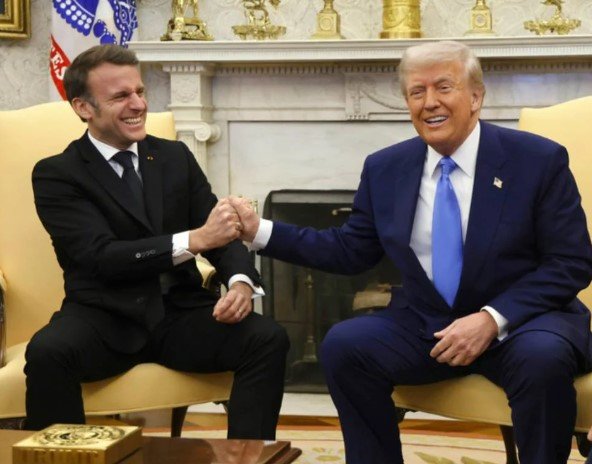French President Emmanuel Macron publicly corrected former U.S. President Donald Trump on Monday, disputing Trump’s claim that European nations were merely loaning money to Ukraine rather than providing direct financial assistance. The sharp exchange took place during a meeting at the White House, highlighting deep transatlantic differences over how to support Ukraine amid its ongoing conflict with Russia.
A Public Fact-Check at the White House
Macron didn’t hold back when Trump suggested that European allies were expecting to be reimbursed for their contributions to Ukraine’s war effort. The French leader firmly rejected the notion, emphasizing that Europe had provided substantial financial aid through grants, not loans.
“No, in fact, to be frank, we paid,” Macron stated. “We paid 60% of the total efforts, and it was through grants, not loans. We provided real money.”
Trump, unshaken by the pushback, responded, “It’s okay with me, but they get their money back. We don’t, and now we do.”

The tense moment underscored a fundamental disagreement between the two leaders: while Trump has expressed frustration over the financial burden on the U.S., European leaders see their contributions as essential to Ukraine’s survival and long-term stability.
European Contributions vs. U.S. Strategy
European nations have been major contributors to Ukraine, both financially and militarily. Macron detailed how European nations had already frozen Russian assets worth around $230 billion, potentially setting the stage for a future settlement with Moscow. Unlike Trump’s portrayal of the situation, Macron insisted that Europe was taking a proactive role, not simply waiting for repayment.
The figures paint a clear picture:
| Contribution Type | Europe’s Share | U.S. Share |
|---|---|---|
| Financial Aid | 60% | 40% |
| Military Support | Significant | Largest |
| Russian Assets Frozen | $230B | N/A |
This table highlights Europe’s major financial involvement, even as Trump continues to frame the U.S. as the primary benefactor.
The Bigger Battle: Peace vs. Sovereignty
While Trump has pushed for a quick resolution to the war, Macron remains adamant that any peace deal must not come at the expense of Ukraine’s sovereignty.
“This peace must not mean a surrender of Ukraine,” Macron stated at a joint press conference. “It must not mean a ceasefire without guarantees.”
Trump, on the other hand, has hinted at a different approach. He suggested that Ukraine might offer the U.S. access to its critical mineral resources in exchange for continued support—an arrangement he believes would help recover some of the $180 billion in American aid sent to Kyiv since the war began.
Zelenskyy’s Potential Role in the Talks
Adding another layer to the discussions, Trump indicated that Ukrainian President Volodymyr Zelenskyy might visit Washington soon to finalize negotiations regarding Ukraine’s economic obligations to the U.S. The meeting, if it happens, could signal a shift in how American aid is structured going forward.
For Macron and other European leaders, however, the priority remains ensuring that Ukraine’s sovereignty and security are not sacrificed in the name of expediency. The disagreement with Trump is not just about financial contributions—it’s about the very nature of how the West approaches the war’s resolution.
